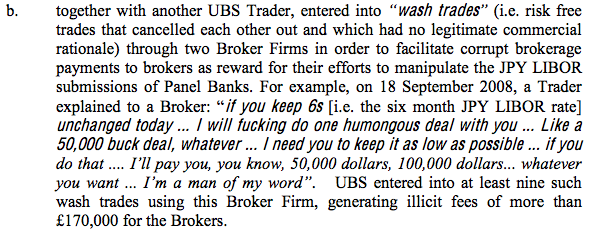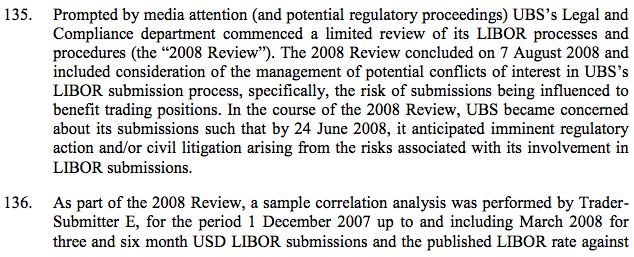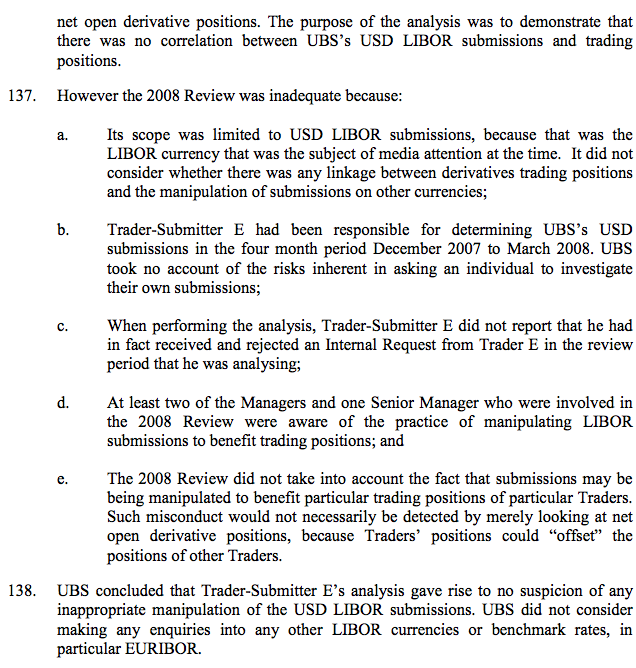By contrast, Barclays is paying $1.5 billion in fines among three regulators: the FSA, the CFTC, and Finma, a Swiss regulator. The Department of Justice’s Lanny Breuer called the fraud “epic” yet only two staffers are targeted for prosecution: the apparent main actor, trader Mark Hayes, and his colleague Roger Darin, who are charged with mail fraud, price fixing, and conspiracy. Yet the FSA’s notice says that 40 individuals at the bank were involved in Libor manipulation, including 4 senior managers, and another 70 individuals were aware of it.
Bloomberg gives a good overview of the scheme if you don’t have time to read the FSA’s notice. The gaming was so extensive that the FSA noted that “every Libor and Euribor submission in currencies and tenors in which UBS traded is at risk of having been improperly influenced”. “Trader A” would often put in internal orders to manipulate prices for months at a time. The perps also bought the support of players at other firms, via offering profit sharing or other bribes, such as this one:

The FSA notice also confirms my pet theory that internal reviews are useless:


The FSA presents this review straight up when it’s hard to take it at face value. It’s hard to imagine that the legal department did not understand the conflicted role of Trader E and thus knew full well what sort of analysis he would gin up. Even though UBS implemented new procedures in 2008 and 2009, these appear to have been about as effective as corporate mission statements, due both to deficiencies in design and implementation. The directives were above all drafted to dampen down negative press (the Wall Street Journal had taken notice); managers who had been involved in the previous manipulation were involved in oversight; and the internal audit group did a mere “walk through” exercise.
This isn’t surprising if you understand the collusive relationship that has developed between front line staff and management in investment banking and trading businesses. As we wrote in ECONNED:
In the financial services industry version of looting, we instead have firms where operational authority is decentralized, vested in senior business managers, or “producers.” Because of industry evolution and perceived competitive pressures, these producers, as a result of formal incentives plus values held widely within the industry, focused solely on capturing the maximum amount possible in the current bonus period. The formal and informal rewards system thus tallies exactly with the topsy-turvy scheme of “maximizing current extractable value.”It turns out that even with extensive examinations, it’s hard to find smoking guns to pin bad activity on top level managers. Remember, the nitty gritty falls to lower-level (although often handsomely paid) professional who communicate with sufficient frequency that it’s possible to find e-mail footprints. And to the extent any of this ground was covered in meetings, PowerPoint only gives the high points; it’s far from a complete record. Senior managers tend to be recipients rather than generators of information, and much of what they convey is verbal: reactions when people come to their desk or office, comments on more formal presentation. And by the time Libor manipulation became an official concern, they’s be sure to be particularly circumspect in any written remarks.
In the past this behavior was positive, indeed highly productive, as long as it was contained and channeled via tough-minded oversight, meaning top management who could properly supervise the business. The main mechanisms are management reporting systems, risk management, and personal understanding of and involvement in day-to-day operations, plus external checks, such as regulations and criminal penalties. For a host of reasons, the balance of power has shifted entirely toward the forces that encourage looting. And because the damage that results cannot clearly be pinned on the top brass (like [the head of AIG's Financial Products unit Joe] Cerullo, they have thin but plausible deniability), it is difficult to ascertain from the outside whether the executives merely unwittingly enabled this process or were active perpetrators.
Based on the FSA notice, Felix Salmon is finally convinced of the widespread nature of bank abuses:
Other fines, for other banks, are sure to follow this one — but if Barclays was dreadful and UBS was much worse than Barclays, it’s hard to imagine that anybody has clean hands here. You want to know why pretty much the entire financial sector is still trading at less than book value? This is why: the number of investors who trust the banks is now zero, and banking seems to have become a game of picking up fraudulent nickels in front of a relentless justice-department steamroller. (And for good measure there are all the civil suits as well: the $1.5 billion that UBS is paying today is just a down-payment on the all-in cost of its Libor fraud.)Felix suggests that UBS has taken the most radical action possible, by pretty much abandoning the fixed income business. Note this appears to have been the result of greatly higher capital requirements in Switzerland. But the Libor scandal may have played a role, since the fixed income operations were the one business unit of four that were led by former UBS managers after the UBS-Swiss Bank merger (even though the UBS name survived, Swiss Bank was actually the dominant player in the deal). The near-closure of the fixed income operations has the former SBC units as the final survivors of that merger.
Bear in mind that this is not the end of the financial toll for UBS. The regulatory orders and notices will facilitate private suits. But that is not at all the same as having the individuals who were ultimately responsible face meaningful consequences.
What Felix depicts correctly as an aggressive measure is still on the wrong axis. So far, the top echelon of UBS is unaffected by this epic scandal. Until we see executives suffer (and fines are insufficient if they reamin wealthy), it’s a no-brainer that this type of behavior will continue, albeit in different businesses and new guises.
Source

No comments:
Post a Comment